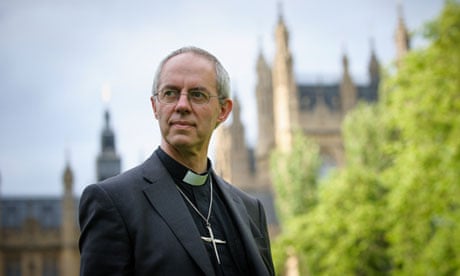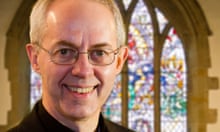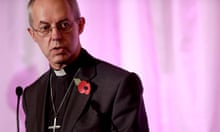There are not many old Etonians who think that the biggest problems facing County Durham are "loan sharking and its consequent evils and very high youth unemployment". There are not many oil company executives who would say that "the pay of many of our top executives in big hundred companies in the UK is outrageous and even obscene … We need to get to the point where there is a general recognition that being paid vast multiples of other people's pay is not acceptable in a society that wishes to be happy and stable." Yet Justin Welby, the old Etonian former oil trader who is to be the next archbishop of Canterbury, said all this and more in an interview with a fellow bishop in The Living Church, an American magazine earlier this year. The headline facts about his biography may be very misleading.
The second most notable thing about Justin Welby is that no one in a very divided church has gone around badmouthing him. There were other candidates who – like him – have no enemies, but none who have no critics, and the others who have no enemies were widely thought to be too dull or just too sane to take the job.
Welby, however, has praise from all corners of the church and he carries the promise of being able to talk as if the Church of England doesn't matter very much. That may seem like an odd qualification to be archbishop of Canterbury, but it may be the essential one today. The temptation for any archbishop is to suppose he is a terribly important figure. The job would expose him to continuous attacks, but would also constantly stroke and inflate his vanity. The gap between pretension and reality is one into which far too many bishops and archbishops simply disappear. Welby appears to be grounded by a rather Etonian appreciation of the brutal realities of power.
"We could send him as an emissary to Nigeria and know that if he was needed to grovel, he could grovel," says Viv Faull, the incoming dean of York who worked closely with him in Coventry, where he started his church career, and later when he was dean of Liverpool and she was dean of Leicester. "He joined the English Cathedral Executives, which I chair. He was utterly supportive, enthusiastic in enabling me to do my job. Everyone in Coventry has said how effective he is. He has a disarming self-deprecation: he is always assuming the best of other people." Then she added: "I don't know how easy it is to know the real Justin Welby."
This was something that many of the people the Guardian talked to said. It may not matter very much in the long run, because whoever the real Justin Welby may be today, the job will change him. Many people thought they knew the real Rowan Williams before he took office, and perhaps they did, but they were to be disappointed by the man he became under the pressure of events. It's not a job in which it is easy to have friends.
The great drawback to his candidacy was the very short time – less than a year – he has spent as a bishop. He was appointed to Durham in 2011, and only enthroned on 26 November. In recent years the Church of England has had a much more conventional career structure, in which candidates for promotion are expected to have done all the right jobs before they got there. Even his leap from dean of Liverpool, an important job but not noticeably glamorous, to Durham, where the Prince Bishops had their own private armies until 1836, was remarkable.
In his short time in Durham he made a great and very favourable impression. Miranda Threlfall Holmes, a church historian who is also one of the leading liberal voices for women's causes, says people in Durham will be "gutted" to lose him.
"We've only had him for just under a year; he's already turned it around. The diocese needs turning around. Durham has the lowest level of churchgoing in the whole of the Church of England. And he's invigorating things; he's changing all our structures. He's completely changed people's attitude to giving in the parishes. Every parish in the Church of England moans about having to pay parish share. It feels like a tax on success. And he said: 'OK, fine, we won't tell you what the diocesan budget is and divide it among you. You tell us what you're prepared to pay and we'll set our diocesan budget based on that.' Which, at a stroke, has transformed the way people think about it, and a lot of parishes have actually put up their giving because he's inspiring. It's a kind of fresh thinking."
He had a similar financial success at Liverpool, where the cathedral has none of the income from tourism which keeps places like Durham afloat. But although it is often said that his skill is with money – and he did work successfully as an oil trader for 11 years – there are plenty of people in the Church of England who can run a spreadsheet. What Welby showed in Durham is that he understands commitment and belief.
In his memo setting out the proposed parish changes, he said: "In all organisational theory power follows money." He also said his new policy was "likely to offer a large improvement on the past in terms of morale and unity … Money is a means to an end. At the same time as the efforts on stewardship, there will be a major push on evangelism, carefully planned and constructed and led directly by the bishops."
The word "evangelical" has a gentle but unmistakably repellent effect on the rest of the Church of England, and a worse one on the general public. But although Welby's background (Eton and Cambridge) is recognisably public school evangelical, and he has been close to the HTB movement, which lies behind the Alpha course and which has been very conservative in matters of sexual politics, he has charmed in person many people who would dislike him from his biography. Threlfall Holmes says: "He's very, very likable. And in some ways that surprises me because all the, you know, old Etonian oil executive thing, I would expect it to put me off. But actually he's not like that … And he didn't send his own children to private school and you can't be blamed for the decisions your parents made. He came and preached at my institution service. The entire parish love him now. He made a point of making all the people with young children welcome. He said: 'Don't worry about any noise your children might make. I can talk louder than any child – I've had six myself.' He just put everybody at ease. There's no pomposity about him. He doesn't want to be called bishop; he's happy just to be called Justin. He talks to people honestly and openly."
The death of one of his children in a car crash when she was only seven months old in 1983 turned Welby and his wife closer to God, he has said. But it still came as a considerable shock when he turned his back on a successful business career to study for the priesthood at the evangelical college Cranmer Hall.
Sir Graham Hearne was his boss then at Enterprise Oil (the firm has now been taken over). Hearne says: "One day he came to see me, and he said: 'Graham, I'm leaving.' And I was horrified, I can tell you. I said to him: 'Oh, Justin, that's very bad news. Why would you leave us? Which company has stolen you?' And he said: 'Don't worry about it. It's the Lord!' And he explained. And I of course was not happy to see him go but I understood fully the reasons. I think I knew he had faith, but he didn't push it in your face at all.
"I do remember that when the investment bankers came in with long-winded presentations he'd get pretty impatient, because he was so quick, you see. He'd look at the slide and say: 'Next!' And then the next slide, he'd go: 'Next!' He liked them to get through it fairly quickly. He of course knew his stuff and so a lot of it was unnecessary. But it did amuse me very often when I observed that."
Now that he sits on the parliamentary commission on banking scandals, looking into the fixing of the Libor rate, among other things, he will have plenty more opportunities to tell investment bankers to hurry their explanations up.
But as archbishop of Canterbury what would really matter is how he navigates the world outside of the establishment. The Church of England for the last 20 or 30 years has been in an extraordinary way much less than the sum of its parts. How is it that an organisation staffed for the most part with clever, thoughtful and imaginative people has managed at a corporate level to be the enemy of all these qualities? How can it get out of this bind?
This is where Welby's curious lack of enemies comes to seem a vital quality. No one doubts his sincerity or seriousness, but it is hard to pin it down to any of the causes which have convulsed the church. "Since all Christians are stuck with each other for eternity it is not a bad idea to learn to love each other before we get to the point of death," he said to The LIving Church. He is presumably opposed to full gay equality, and in favour of female bishops. Those are the default positions for evangelicals of his kind. But no one suggests that he thinks either of these are the most important questions facing the church or the country. Neither, of course, did Rowan Williams. That did not prevent them from eating most of his time and energy. Perhaps the real benefit of Welby's business background will be that he is more easily able to concentrate on his own agenda amid the distractions of the world than his unworldly predecessor ever proved.






